

FIG Task Force on Evolutionary Diversity and Inclusion
|
| News | Terms of reference | Outcomes | Members |

 Follow on LinkedIn
Follow on LinkedInProgress reports from Task Force Evolutionary Diversity and Inclusion at FIG General Assemblies:
2025: Report · Presentation 1 · Presentation 2 · Report Legacy Project
2024: Report · Presentation 1 · Presentation 2
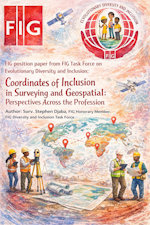 FIG
Position paper on Coordinates of Inclusion
FIG
Position paper on Coordinates of Inclusion December 2025
The paper presents “coordinates of inclusion” as a metaphor for how the surveying and geospatial profession positions people within its professional landscape. It argues that inclusion is a strategic necessity for innovation, sustainability, and relevance, built on the interconnected principles of diversity, equity, and inclusion. Despite progress, persistent barriers such as gender inequality, cultural expectations, and institutional biases continue to limit participation and representation, particularly for women and underrepresented groups.
Drawing on his personal professional journey, Surv. Stephen Djaba highlights the transformative role of mentorship, collaboration, and inclusive leadership. The paper emphasizes that inclusive representation strengthens innovation, public trust, and global relevance, and calls on young surveyors to build a people-centred profession by promoting equitable participation, celebrating diverse role models, and using geospatial tools to help identify and address social inequalities.
June 2025
During the
FIG Working
Week 2025 in Brisbane, Australia, the two FIG task forces on
“Diversity and Inclusion” and “FIG
and the SDGs”, in collaboration with
She Maps, organised a touching legacy project which will stand as a
lasting testament to this event.
They had developed a visual piece that connects past, present and future:
comparative images of Brisbane in 1975 and 2025, which were accompanied by
a commemorative plaque. This legacy is not just a frame with images, but a
visual story that reminds us how much a city can change, and how essential
geospatial technologies are to understand that change. Beyond that, it
leaves behind something tangible for the next generation.
There is a need for teachers who inspire, we need images that tell
stories, and we need young people to see themselves as part of the change.
Read the Legacy Project report
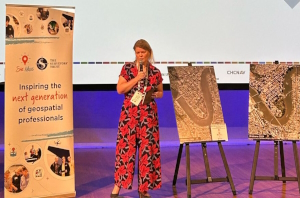 |
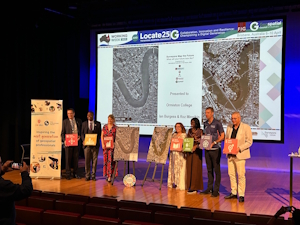 |
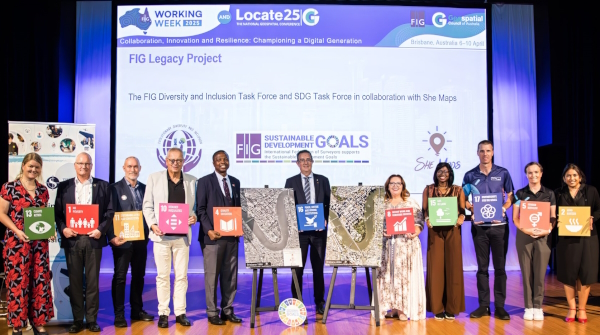
June 2024
During the
FIG Working Week 2024 in Accra, Ghana, The Chair of
the FIG Task Force on The Surveyor's Profession: Evolutionary Diversity
and Inclusion, Stephen Djaba had arranged a Globe of Tomorrow
project Commissioned at Services Primary school at Burns Camp in
Accra.
FIG representatives, local participants and others - incl. FIG President
Diane Dumashie, Honorary President Stig Enemark and chair of the Task
Force on FIG and the SDGs Paula Dijkstra - went to the local school where
expectant students were waiting for them. A large and impressive globe was
unveiled in the school yard - a lasting memory of the FIG Working Week
2024 and a reminder to young students of how important geography and
cooperation around the world is.
This will mark a lasting remembrance of the FIG Working Week 2024 in
Accra, Ghana, and will hopefully inspire students to the profession in the
future.
This project was planned to be the first of more similar projects to come.
 |
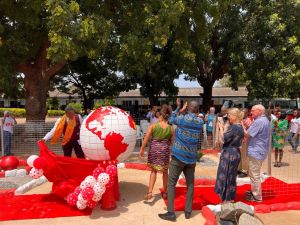 |
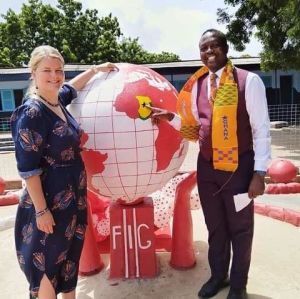 |
 |
See the GBC Broadcast
video from the FIG Legacy School project special event:
You can follow the task force on LinkedIn at: https://www.linkedin.com/showcase/evolutionary-diversity-fig-task-force
The task force was established at the FIG Working Week 2023 in Orlando, Florida, and its Terms of Reference was approved by FIG General Assembly on 28 May 2023 as well as the appointed chair Stephen Djaba.
During the Working Week the Task Force held a session on Diversity and Inclusion in the surveying profession.
Generational sustainability is an important aspect of The Surveyor's
Profession: Evolutionary Diversity task force. The task force aims to
promote diversity and inclusion within the surveying profession, not only
in terms of race, gender, and ethnicity, but also in terms of age and
generational diversity, including Gen X, Y, and Z. This is important
because it ensures that the surveying profession is sustainable and can
continue to thrive in the long term.
To achieve this goal, the task force can focus on a number of initiatives,
such as promoting mentorship and knowledge transfer between different
generations of surveyors, from Gen X to Gen Y, and Z. They can also work
to address issues related to age discrimination and ensure that older
surveyors are not excluded from opportunities for professional development
or advancement.
Additionally, the task force can work to attract Gen Y, Z and Gen Alpha to
the profession by highlighting the exciting and innovative technologies
and tools used in surveying and by emphasizing the importance of
sustainability and environmental stewardship in the field. This can help
to ensure that the surveying profession continues to evolve and adapt to
changing needs and technologies, while also remaining diverse and
inclusive across all generations.
Malinowski Tomasz (Poland):
Success in Life. (12229)
[abstract]
[paper]
[handouts]
[video]
Generational sustainability is an important aspect of The Surveyor's Profession: Evolutionary Diversity task force. The task force aims to promote diversity and inclusion within the surveying profession, not only in terms of race, gender, and ethnicity, but also in terms of age and generational diversity, including Gen X, Y, and Z. This is important because it ensures that the surveying profession is sustainable and can continue to thrive in the long term.
To achieve this goal, the task force can focus on a number of initiatives, such as promoting mentorship and knowledge transfer between different generations of surveyors, from Gen X to Gen Y, and Z. They can also work to address issues related to age discrimination and ensure that older surveyors are not excluded from opportunities for professional development or advancement.
Additionally, the task force can work to attract Gen Y, Z and Gen Alpha to the profession by highlighting the exciting and innovative technologies and tools used in surveying and by emphasizing the importance of sustainability and environmental stewardship in the field. This can help to ensure that the surveying profession continues to evolve and adapt to changing needs and technologies, while also remaining diverse and inclusive across all generations
Technology is evolving rapidly within the Surveying profession and culture now more than ever. Remote and global technologies, enabled by the Internet of Things, are bridging the work culture of the profession. This is important because it underscores that the future of a global expert community of surveying practitioners is already here.
If surveyors fail in the eyes of society, it could mean the end of the surveying profession within local communities – where surveying makes the most difference of all. There are several case 2 studies across countries in both the global north and global south which indicate this is the case – and there is a significant ethical risk for the entire surveying profession as technologies continue to evolve in leaps and bounds.
Within the context of the UN's transformative promise of the 2030 Agenda for Sustainable Development and its SDGs, ‘Leave no one behind’, this raises the case for FIG, as a global leader of the profession to proactively advocate for the changes that our industry needs to remain relevant, contribute to create positive solutions for people and planet, and to ensure that the discipline of surveying and all who practice it meet the needs of the markets and communities that they serve. Through this, we can ensure that local surveyors in under-connected networks have capabilities for prosperous work as well as those in privilege.
However, despite the importance of surveying, many women and minorities are not aware of the profession or its potential as a career path and influence on local communities. This Task force will seek to address this during its deliberations.
Our aims are amplified further in Appendix A, providing the context and key factors such as the state of diversity in the industry and systemic bias in the workforce.
The Evolutionary Diversity task force will be composed of a diverse group of individuals from GEN Z, GEN Y and GEN X with expertise in surveying, to foster diversity and inclusion. The workforce of the task force may include, but not be limited to:
The task force will benefit from the diversity of its members and their unique perspectives and experiences. Members will be selected based on their expertise, experience, and commitment to promoting diversity and inclusion in the surveying profession. The task force will strive to ensure that it is inclusive and representative of the diverse communities that it serves.
Ensuring there is a competent and experienced profession drives confidence from the public in land surveying, hydrography, mining, engineering etc. The Surveying and Spatial industry are key contributors to supporting this level of confidence recognised by all levels of the profession from entry level to the highest ranks of the profession as a Licensed Surveyor. Keeping focus on evaluating and improving (continuous improvement) the education, training and accreditation system to meet the needs of industry and the future workforce that will be required to raise the reputation of the profession into the future. Within society, the composition of the modern globalised workforce is changing, as are technological developments (such as big data) and the legislation around surveying and related industrial relations.
The detailed composition of the core members can be found in section 6 below.
The aim of the Task force is to promote the Diversity and Inclusion 2023- 2026 theme of the FIG term. Its main objectives are to determine present and futuristic projection (based on technological advancement) of how FIG can remain relevant as a profession of choice. Specific areas of contribution identified for this task force include:
To facilitate this from establishment, this TF will present its draft Terms of Reference and consult all FIG Commissions and other TFs in the leadup to the FIG Working Week 2023 in Orlando regarding its work planning process.
The Task Force objectives will seek to:
A valuable outcome of this Task Force will be to position FIG as a relevant and credible professional body, in the advancement and regulation of the survey practice within governing laws, while ensuring equitable, diverse and inclusive access to wealth of knowledge and expertise. Through this:
| Year | Key Objectives | Details |
| 2023 | Approval of ToR and TF members Create and set up project charter | FIG WW 2023 Orlando - Hold initiating Task force meeting |
| 2024 | Basic Data for the reports | FIG WW 2024 Accra - Task force meeting |
| 2025 | Delivery of draft ideas, concepts and rational | FIG WW 2025 Brisbane - Task force meeting |
| 2026 | Main Delivery of final report (adjust in time,technology) | FIG WW 2026 Cape Town - Task force meeting |
6. Future Outcome Targets
To address the relevance of our profession this Task force identifies five strategic targets that need action to keep our Profession attractive to our youth as a viable profession to pursue:
The TF commits to ensuring diversity and inclusion amongst the TF Core Team to the full extent possible, inclusive of gender, geography, age, cultural background, and other identity factors. Additional Core TF members may be added after discussion at Orlando FIG Working Week. During the Orlando meeting, there will be a specific attempt to reach out to people across FIG 6 regions and to include a range of diverse identities (age, gender, cultural background, geographic location through FIG region, people with disabilities, people with caring responsibilities, First Nations People, etc) to join this Core Team. Further members may be appointed over time as deemed necessary.
Chair:
Stephen Djaba (Ghana) - stephen[at]ghana.com
| Name | Country | FIG Region | Gender |
| Tomasz Malinowski | Poland | Europe | Male |
| Nigel Sellers | United Kingdom | Europe | Male |
| Angela Anyakora | Nigeria | Africa | Female |
| Roshni Sharma | Australia | Asia and the Pacific | Female |
| Enrico Rispoli | Italy | Europe | Male |
| Ann SHEN | China | Asia | Female |
| South America | |||
| America |